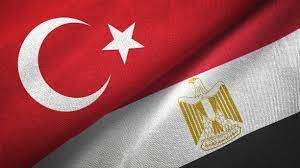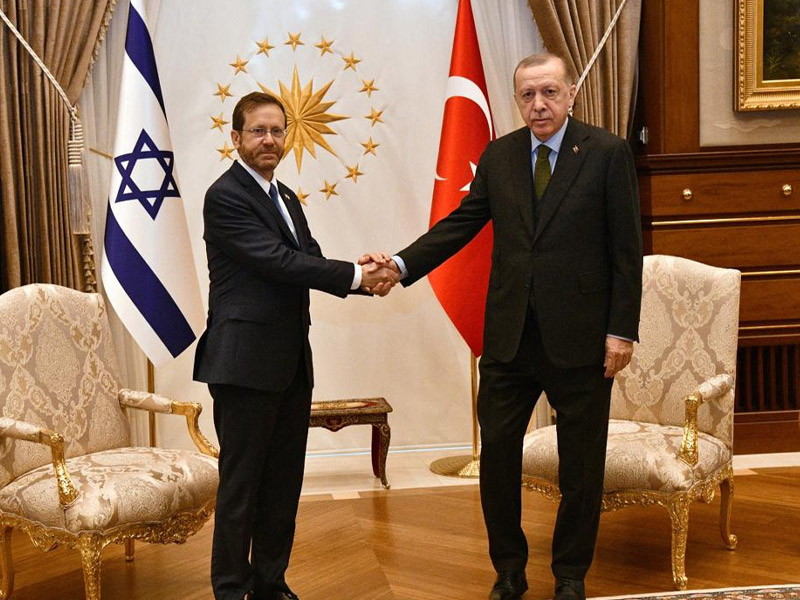 In a complete reversal of his incessant attacks against the Egyptian government since the 2013 revolution, Turkish President Recep Tayyip Erdogan has launched a massive media and diplomatic campaign to mend the ties with Egypt.
In a complete reversal of his incessant attacks against the Egyptian government since the 2013 revolution, Turkish President Recep Tayyip Erdogan has launched a massive media and diplomatic campaign to mend the ties with Egypt.
Talks scheduled for next week could open the door to closer relations and help end a battle for control in Libya, where Egypt and Turkey have backed opposing forces.
Erdogan's ruling AKP party last week proposed a parliamentary friendship group with Egypt. But Erdogan finds himself increasingly isolated and facing a severe economic crisis at home. The already weak Turkish Lira approached an all-time low versus the U.S. dollar this week after President Biden officially recognized the Armenian genocide.
"Erdogan faces a new American administration that will not spoil him," former Egyptian MP Mostafa El Feky told an Egyptian news program. Turkish Foreign Minister Mevlut Cavusoglu said last month that his country is seeking to improve the diplomatic relations with Egypt and hailed a "new era" of relations between the two countries.
But Egypt, while open to dialogue, has been skeptical about Turkey's overture. "Official statements are not enough, and they should be supported by actions, and I can also say that actions are the only way to restore relations with Turkey to their normal position," said Egyptian Foreign Minister Sameh Shoukry.
Egypt wants Turkey to recognize the June 2013 revolution that ousted the Muslim Brotherhood-led government led by Erdogan ally Mohamed Morsi. Turkey reportedly accepted that condition.
It was that revolution that wrecked Egyptian-Turkish relations. Erdogan supported Morsi and the Muslim Brotherhood and has repeatedly criticized the Egyptian government. He also backed Morsi after authorities arrested him and charged him with a series of crimes, including inciting violence against protesters while he was in office. He was convicted in 2015 and sentenced to 20 years in prison.
Egypt expelled Turkey's ambassador in response.
Erdogan continued criticizing Egyptian President Abdel-Fattah al-Sisi. In 2019, Erdogan questioned Morsi's death, which came during a court hearing, calling al-Sisi a murderer. "I don't believe it was normal," he said.
In February 2019, Erdogan said he would never reconcile with al-Sisi.
The move comes in the wake of failed Turkish military interventions, including supporting Muslim Brotherhood elements in Libya, that have left him with no real allies. The rapprochement is seen as Erdogan's attempt to find a new approach and repair the damage.
Diplomatic Isolation
Under Erdogan, Turkey is one of the world's top terrorism sponsors in the world, Ivan David, a member of the EU Parliament from the Czech Republic wrote last month on his Facebook page. He described Turkey as "a large prison that resembles concentration camps," because of the number of jailed government critics.
Turkey's isolation became more apparent when Egypt launched the East Mediterranean Gas Forum EMGF in 2019, including Greece, Cyprus, France, Israel, Italy, Jordan and the Palestinian Authority. The United States and European Union serve as permanent observers. Turkey doesn't have any known gas production fields, and its political animosity extended to forum members, including Greece, Cyprus and France. Egypt maintains close military and economic relations with those countries.
The European Union also has taken tougher measures against Turkey. It is imposing economic and political sanctions because of Turkey's unilateral gas exploration in waters Cyprus and Greece already claim. Turkey's economic woes have been worsened by the ongoing Covid-19 pandemic.
Meanwhile, Biden's recognition Saturday of the 1915 Armenian genocide by the Ottomans triggered an angry response from Ankara. Spokesman Ibrahim Kalin called it an "unfortunate, unfair statement" that will affect "[e]verything that we conduct with the United States." But the conflict between Egypt and Turkey runs deeper than a simple political feud. Turkey hosts more than 20,000 Muslim Brotherhood supporters, some of whom are wanted by Egyptian authorities for involvement in terrorist activities.
Islamist Media Incitement
Moreover, Turkey hosts a number of Muslim Brotherhood operated TV networks. Until given recent orders to quiet their criticism, those outlets focused solely on broadcasting mostly fabricated videos about violence or protests taking place in Egypt.
Some anchors on these networks called for violence: " I am telling you live on air; kill his officers, I want to tell every officer's wife; your husband will be killed, maybe not today but tomorrow or day after. He will be killed anyway," said Mohamed Nasser in 2015 after Egyptian officers were killed.
Turkish authorities never asked them to close their networks but did request they tone down the criticism against Egyptian authorities, Ayman Nour, a Muslim Brotherhood affiliate and head of the Turkish-based El Sharq TV, told Al Jazeera's Mubasher news network. But Brotherhood members in Turkey reportedly are panicked over the possibility of Turkey giving up on them.
"I see some comments here and there on this subject, and rumors claiming that Turkey was selling the Egyptian opposition ... There are some opponents to whom we addressed the necessary warnings, especially those who exaggerate the extremist rhetoric against Egypt," said Turkish Foreign Minister Cavusoglu.
But he acknowledged that "the world is changing at a rapid pace, so is foreign policy.... We must be entrepreneurs, and we must find solutions to disputes."
"Turkey has lost the struggle for power it entered with countries, starting with Egypt, in the eastern Mediterranean and has essentially waved a white flag by ignoring the arguments he (Erdogan) uttered against Sisi," Turkish journalist Ergun Babahan wrote in the Cyprus-based Turkish online daily Ahval. "All countries, starting with Egypt, are aware that Erdoğan is looking to gain power and waits on a change in international balances – that he is not seeking a relationship based in negotiations."
Erdogan's interventionist and authoritarian policies have left him without regional allies. His attempt at a rapprochement with Egypt signals an act of desperation. Contrary to Erdogan's statements, many Egyptians are not as enthusiastic about mending relations with Turkey given the neo-Ottoman ideology dominant among the rulers in Ankara and the role the country played in supporting terrorists who caused mayhem and death since 2013. Moreover, Egyptian authorities regard Erdogan's government as a main proponent of an Islamist ideology and a terrorist group which is considered the main enemy of the country. Accordingly, improved relations with Erdogan is not high on Egypt's agenda and may not happen.
IPT Senior Fellow Hany Ghoraba is an Egyptian writer, political and counter-terrorism analyst at Al Ahram Weekly, author of Egypt's Arab Spring: The Long and Winding Road to Democracy and a regular contributor to the BBC.
Copyright © 2021. Investigative Project on Terrorism. All rights reserved.



 Erdogan's Political Changes Rile Islamists
Erdogan's Political Changes Rile Islamists
 American Islamists Again Embrace Erdogan's Authoritarianism
American Islamists Again Embrace Erdogan's Authoritarianism
 Brotherhood Turns to Retired Egyptian Soccer Icon in Rebranding Effort
Brotherhood Turns to Retired Egyptian Soccer Icon in Rebranding Effort